In the extremely competitive field of e-commerce, distinguishing yourself and boosting growth demands more than just a fantastic product and an elegant custom e-commerce platform. Artificial intelligence (AI) is transforming how online companies attract consumers, engage with them, and convert browsers into loyal customers. The latest strategies in e-commerce today are AI-related, with hyper-personalized recommendations and fully automated campaigns.
AI provides businesses with speed, intelligent insights, and enhanced engagement at every interaction. It enables AI-driven e-commerce marketing to thrive through behavior-based email campaigns or fine-tuned product descriptions. Real-time adaptation, immediate reaction to customer behavior, and optimized e-commerce marketing strategies are all made possible with AI.
This guide covers workable, AI-powered e-commerce marketing tips that will enable you to improve sales and increase traffic. It shows how leading companies are employing artificial intelligence to expand wisely by means of actual examples and the most current industry analysis. This advice will enable you to make artificial intelligence a useful component of your e-commerce marketing arsenal, whether you are only starting or looking to enhance current approaches.
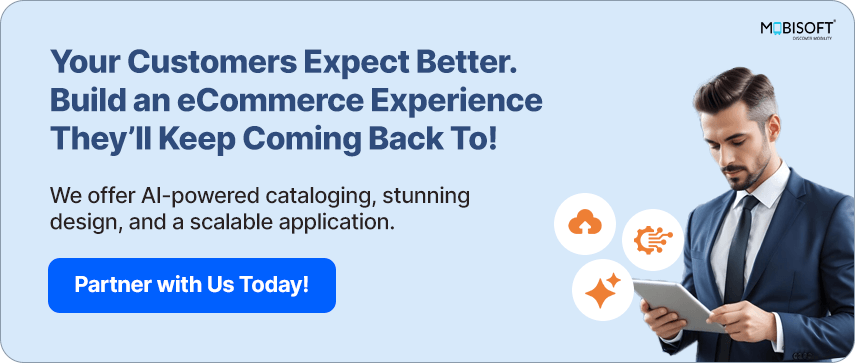
Why Does AI Matter in E-commerce Marketing?
Artificial Intelligence (AI) is transforming how businesses approach e-commerce marketing by redefining how companies connect with their customers. With AI in e-commerce, brands can deliver AI-powered personalization across every interaction, monitor behavior, and optimize the entire customer journey. AI lets merchants anticipate rather than merely respond to customer demand, making it essential in today’s e-commerce marketing strategy.
Real-time artificial intelligence gathers insights from browsing patterns, purchase history, and user behavior. This enables companies to provide highly relevant and timely experiences. Whether someone is a returning customer or a first-time visitor, AI e-commerce marketing ensures they encounter content that feels uniquely tailored to them.
With AI, Businesses Can:
Deliver Personalized Recommendations and Content at Scale
AI follows consumer purchases, clicks, and views. These points towards products or content are most likely to convert. Higher engagement and returning consumers result from this personal touch.
Automate Repetitive Marketing Tasks
From audience segmentation and A/B testing to triggered email campaigns, AI handles time-consuming tasks with efficiency. This level of AI marketing automation for e-commerce ensures consistency across campaigns and optimizes time.
Analyze Massive Datasets for Actionable Insights
Within seconds, AI can scan thousands of data points. It helps uncover trends in consumer behavior, product performance, and campaign results, driving smarter, faster decisions within your e-commerce marketing strategies.
Predict Customer Needs and Optimize Campaigns in Real-Time
Artificial intelligence doesn’t just analyze the past; it predicts future behavior. It identifies intent signals and dynamically adjusts campaigns to deliver the right message at the right moment using predictive analytics for e-commerce growth.
These capacities produce actual business results. Driven by artificial intelligence, e-commerce marketing plans have been demonstrated to improve conversion rates, raise mean order value, and maximize return on investment. Businesses that include artificial intelligence in their e-commerce marketing services sometimes notice up to 20% greater engagement and 15% revenue growth.
Artificial intelligence helps companies advance from guesswork to accuracy. In the fast-moving e-commerce digital marketing environment of today, such accuracy could make all the difference.
Source: Exploring the power of AI in e-commerce marketing
Personalization in E-commerce: The Core of AI-Driven Growth
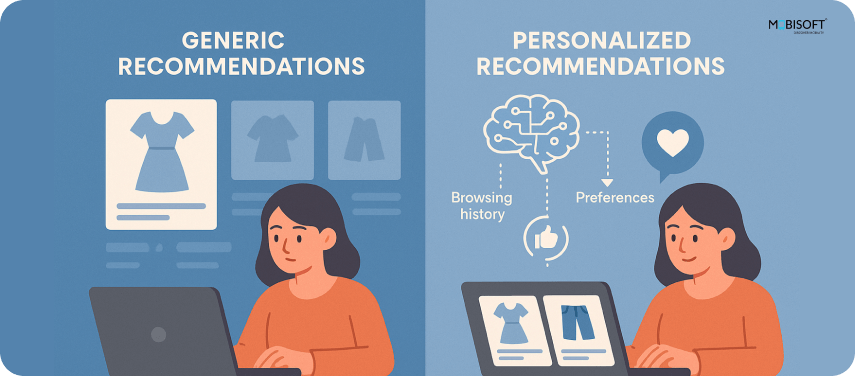
In the modern age, common shopping encounters don't function anymore. Today's customers want every contact to mirror their interests, preferences, and habits. They want brands to remember them, recognize them, and offer precisely what they're seeking, without asking. That's where artificial intelligence in e-commerce steps in.
Artificial intelligence allows great customization at scale. It not only gathers information but also comprehends it. AI can create a personalized experience for every visitor in real time by studying how customers navigate, shop, and communicate.
This results in:
Real-time Personalization of Product Recommendations, Offers, and Content
As visitors engage with your site, artificial intelligence updates recommendations, ensuring every click enhances the experience even further.
Dynamic adjustment of website layout and messaging based on user data
Headlines, banners, and product displays can change depending on consumer behavior, thereby boosting the likelihood of interaction and conversion. This is an essential aspect of AI-powered e-commerce personalization.
Higher engagement and conversion rates by making every visitor feel understood.
When customers see content that matches their intent, they are more likely to take action. Implementing e-commerce AI tools for personalization can make this possible at scale.
Example: To present the most pertinent goods, offers, and content, AI personalization engines analyze a consumer's shopping and browsing habits. A returning customer could see fresh arrivals in their preferred category or a restock of an item seen previously. Purchasing is more likely, and long-term loyalty is developed when one feels seen.
Source: How AI Is Changing Ecommerce Personalization
AI Product Recommendations to Increase E-commerce Sales
Recommendation systems are the most significant use of AI in e-commerce. They help customers discover things they never even knew they needed. These systems are the most significant use of AI in e-commerce. They help customers discover things they never even knew they needed. In the process, they quietly boost sales figures all around, helping increase e-commerce sales with AI.
AI-driven suggestions can:
- Process customer data (browsing activity, purchase activity, cart activity) to reveal extremely relevant AI product recommendations for e-commerce.
- Enhance cross-sells and upsells by providing complementary items related to what the customer is viewing or purchasing.
- Tailor each step of the process, whether through email promotions, homepage banners, or checkout pages.
Impact: Amazon is notoriously crediting 35% of its overall revenue to its recommendation engine powered by AI3. The personalized recommendations retain customers longer and raise their chances of purchasing more.
Tip: Platforms such as Wisepops and OptiMonk enable companies to provide such customized experiences via on-site pop-ups, email series, and dynamic web copy. These platforms utilize behavior-driven triggers and AI logic to induce increased click-through and conversion rates.
Learn how AI tools for e-commerce are shaping the future of e-commerce marketing by improving customer targeting, engagement, and conversions.
Dynamic Content and Landing Pages
AI allows brands to break free from the constraints of one-size-fits-all sites. Today's consumers expect content that specifically responds to their interests, intent, and stage in the buying process. AI in e-commerce makes this a reality, as it creates dynamic landing pages and personalized website components that adjust in real-time.
Instead of sending all the visitors to a static generic page, AI makes the experience personalized from the very beginning. It modifies layouts, titles, banners, and product choices based on the visitor's identity and their requirements. This level of AI-powered e-commerce personalization significantly improves user engagement and drives conversions.
Artificial Intelligence can:
Auto Adjust Content by Source, Behavior, or Location
Customize your images and messages based on referral source, browsing, location, device type, or even time of day
Make the acquisition process simpler
Highlight the most likely-to-buy products. Position shopping carts on landing pages to reduce the process from interest to checkout, a practical use case for AI tools for e-commerce.
Drive conversions with tailored experiences
When a landing page addresses the need and intent of the buyer, it establishes their trust and pushes them towards buying. This is at the core of effective e-commerce marketing strategies.
Example: When the customer taps on the running shoe ad on Instagram, the AI builds a landing page with the same shoes, matching accessories, and a fast checkout section. The personalized experience keeps the customer focused, reduces distractions, and increases the chances of conversion.
Pages created by AI not only look impressive, but also perform better. They convert faster, react to live signals, and help brands scale with personalized engagement, ultimately contributing to the success of your ecommerce development services.
Customer Segmentation and Targeted Campaigns
Effective e-commerce digital marketing begins with knowing your audience and reaching out to them in a manner that resonates as intimate. This is where AI truly shines. It applies real-time behavior and demographic data to segment your audience with unparalleled accuracy.
Legacy segmentation commonly employs static data or pure guessing. AI does the opposite. It constantly optimizes segments as consumers interact with your brand so that your campaigns are always timely and relevant. This is one of the strengths of AI e-commerce marketing.
AI Assists in Audience Segmentation With
Browsing and Purchase History
Monitor what people browse, leave behind, and purchase to determine preference and intent, a method widely used in AI in e-commerce marketing.
Demographics and Location
Personalize your messages based on the location of the customers, the devices they use, or their languages.
Engagement With Past Campaigns
Use open rates, click behavior, and past responses to improve future targeting.
With Precise Segmentation, You Can:
- Carry out well-targeted campaigns.
- Develop messaging that resonates with the needs, behavior, and values of each audience segment.
- Reduce ad spend waste
Spend the budget on those high-intent users who will convert more, instead of diluting it too thin. Increase click-through and open rates. Write tailored emails and SMS messages that appeal to the individual interests of every recipient.
Tip: Avoid creating segmentation as a project one-off. Employ AI to continuously optimize your groups based on how customers change.
Consumer behavior changes fast; so should your campaigns. Smart segmentation is the power behind targeted marketing. Powered by AI, it is quicker, more precise, and much more potent.
AI for Content Creation and SEO
For rising e-commerce companies, consistently generating excellent content is a difficulty. Artificial intelligence streamlines that procedure. It helps you to write, refine, and scale content that connects with your audience, thereby raising your search engine rating. AI can hasten production without compromising quality, whether you are designing your next blog or creating product pages.
AI Can Streamline Content Creation and Boost Your SEO:
- Generate product descriptions, headlines, and ad copy tailored to your audience, automating parts of your e-commerce marketing services.
- Analyze top-performing keywords and optimize content for search engines using answer engine optimization e-commerce techniques.
- Create unique, engaging blog posts and social media content at scale using AI tools to boost online store sales.
Impact: AI-driven content and SEO tools can help you reach a larger audience and improve organic traffic. This is crucial in any effective e-commerce marketing strategy.
AI Chatbots for E-commerce Customer Engagement
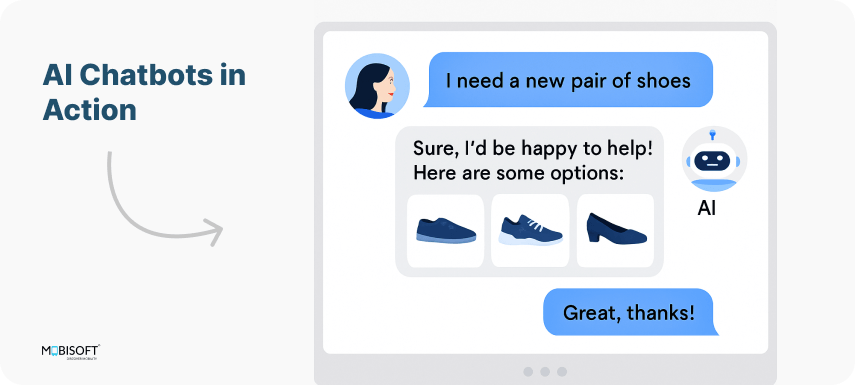
Regardless of when they contact, consumers want rapid, kind replies. Instant, around-the-clock assistance offered by AI-powered chatbots for e-commerce in 2025 and virtual assistants enables companies to satisfy this need. These instruments help customers, customize interactions, and increase conversions without requiring a human on standby; they go above FAQ answering.
AI Chatbots for E-commerce Customer Engagement
- Answer common questions, recommend products, and guide users through checkout.
- Collect leads and feedback, increasing conversion opportunities.
- Personalize conversations based on user data and behavior a central benefit of AI in e-commerce.
Tip: Implement AI chatbots like Lyro by Tidio to automate support and drive more sales as part of your e-commerce digital marketing agency toolkit.
Source: 5 Ways AI Can Drive eCommerce Sales Higher
AI-Driven Retargeting and Remarketing
Not every visitor turns out to be a conversion on their initial visit, but this does not imply the chance is gone. With highly focused, customized AI-driven retargeting that feels relevant rather than repetitive, artificial intelligence enables companies to bring back prospective customers. This method improves the odds of abandoned carts being retrieved and interest being translated into activity, key to increasing e-commerce sales with AI.
Retargeting is More Effective with AI:
- Analyze user behavior to deliver personalized ads for products they viewed or abandoned in their cart, enabled by AI e-commerce marketing.
- Optimize ad placements and bids in real time, maximizing ROI and reducing wasted spend.
- Increase recovery of abandoned carts and encourage repeat visits, using AI marketing automation for e-commerce.
Example: AI-powered retargeting on Facebook and Google can dynamically show users the exact products they considered, boosting conversion rates through e-commerce AI tools.
Predictive Analytics for E-commerce Growth and Strategy Optimization
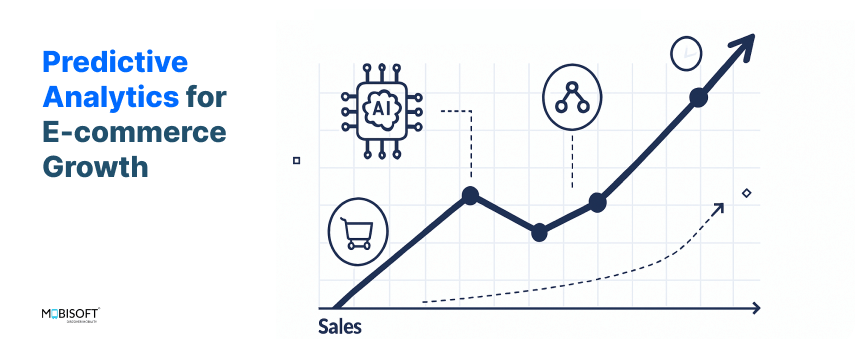
E-commerce brands can use predictive analytics for e-commerce growth to look down the road, predict trends, expect changes in consumer behavior, and make better decisions related to marketing, inventory, and retention, essentially anticipating customer needs and staying ahead of the curve.
AI Uses Predictive Analytics to Forecast Trends and Optimize Marketing:
- Anticipate customer needs and recommend products before they’re searched for.
- Forecast demand to optimize inventory and avoid stockouts.
- Identify at-risk customers and trigger retention campaigns
Tip: Use AI analytics to inform your marketing calendar, inventory planning, and promotional strategies for maximum impact a vital step in any ecommerce marketing strategy.
Enhancing E-commerce UX with AI-Powered Personalization
A flawless user experience keeps customers interested and converts. AI in e-commerce fine-tunes every aspect of your website navigation, search, design, and content so that it meets the tastes of every user. The result? A more seamless, intuitive shopping journey that brings customers back.
AI enhances the overall shopping experience by:
- Testing and optimizing site layouts for usability and conversion.
- Personalizing navigation, search results, and product displays.
- Reducing friction and making it easier for customers to find what they want.
Impact: Improved UX leads to longer site visits, higher satisfaction, and more sales. These are key goals of every e-commerce digital marketing agency and marketing team.
Best AI Tools for E-commerce Marketing
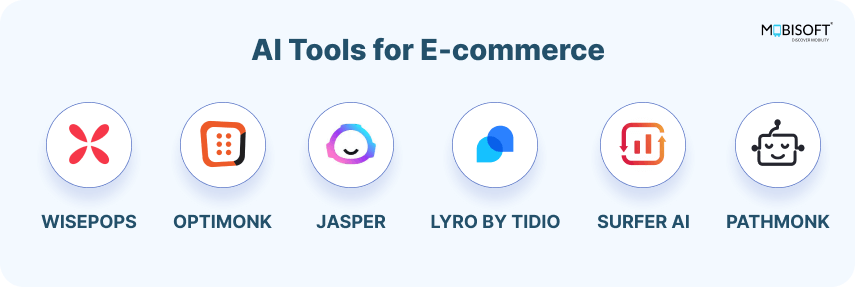
| Tool | Key Features | Use Case |
| Wisepops | AI product recommendations, pop-ups, multi-channel | Boosting engagement & sales |
| OptiMonk | Real-time personalization, segmentation, and content writing | Conversion rate optimization |
| Jasper | Automated marketing copy creation | Content generation |
| Lyro by Tidio | AI-powered chatbot for support | Customer service automation |
| Surfer AI | SEO optimization, competitor analysis | Content & SEO strategy |
| Pathmonk | AI-driven journey optimization, interactive questionnaires | Guided selling & personalization |
Source: AI Tools for Ecommerce to Grow Your Business in 2025
These are among the best AI tools to boost online store sales and enhance your e-commerce marketing services.
FAQs About AI in E-commerce Marketing
Q: How does AI increase e-commerce sales?
A: AI increases sales by personalizing recommendations, automating targeted campaigns, optimizing user experience, and predicting customer needs, resulting in higher conversion rates and average order values.
Q: Can small businesses benefit from AI marketing tools?
A: Yes. Many e-commerce AI tools are accessible, scalable, and cost-effective for businesses of all sizes.
Q: What’s the best way to start with AI in e-commerce marketing?
A: Start with AI-powered product recommendations and chatbots for e-commerce 2025, then expand to content creation, SEO, and predictive analytics as you grow.
Conclusion & Next Steps for AI E-commerce Marketing Success
AI today is changing e-commerce marketing by delivering a personalized, data-led experience at every encounter. Smart recommendations, real-time segmentation, and predictive insights. if there’s one thing AI is doing well, it’s turning browsers into buyers (and increasing competition every day).
When you deploy AI across content, retargeting, and analytics, you generate more traffic, higher conversions, and increased customer value. Whether you're experimenting with one tool or scaling across multiple platforms, the beauty of AI in e-commerce is its ability to grow with your business.
Start somewhere, most brands choose one area of focus to start, for example, either personalization or chatbot automation, and once you are seeing results and impact, begin to grow and expand. In a rapidly changing world, AI isn't an option anymore, and it's not an advantage to be ahead of your competition; it’s fast becoming a necessity for any brand wanting to stay in the race.
Excited to charge your e-commerce marketing campaign with AI?
Contact Mobisoft Infotech to get tailored AI solutions for e-commerce that drive traffic, boost engagement, and increase sales.
Find out about our AI-enabled marketing platforms and turn your online store into a growth machine today!
Recommended Reads on AI in E-commerce Marketing
How AI is transforming e-commerce marketing | Adjust
20+ AI Tools for Ecommerce to Grow Your Business in 2025
How AI Is Changing Ecommerce Personalization
5 ways AI can drive eCommerce sales higher | OuterBox


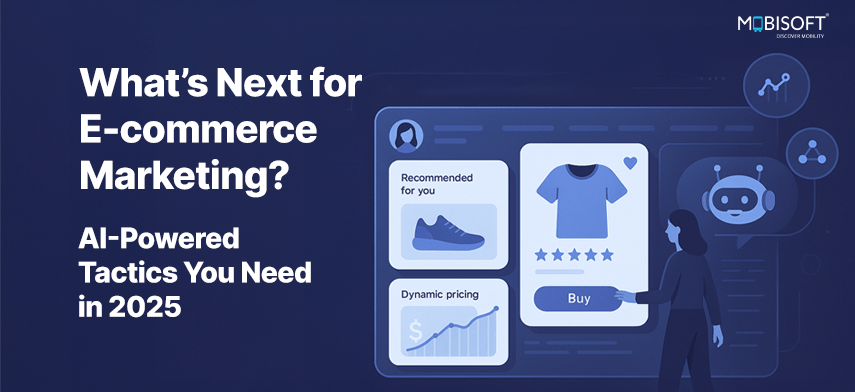


 July 11, 2025
July 11, 2025


